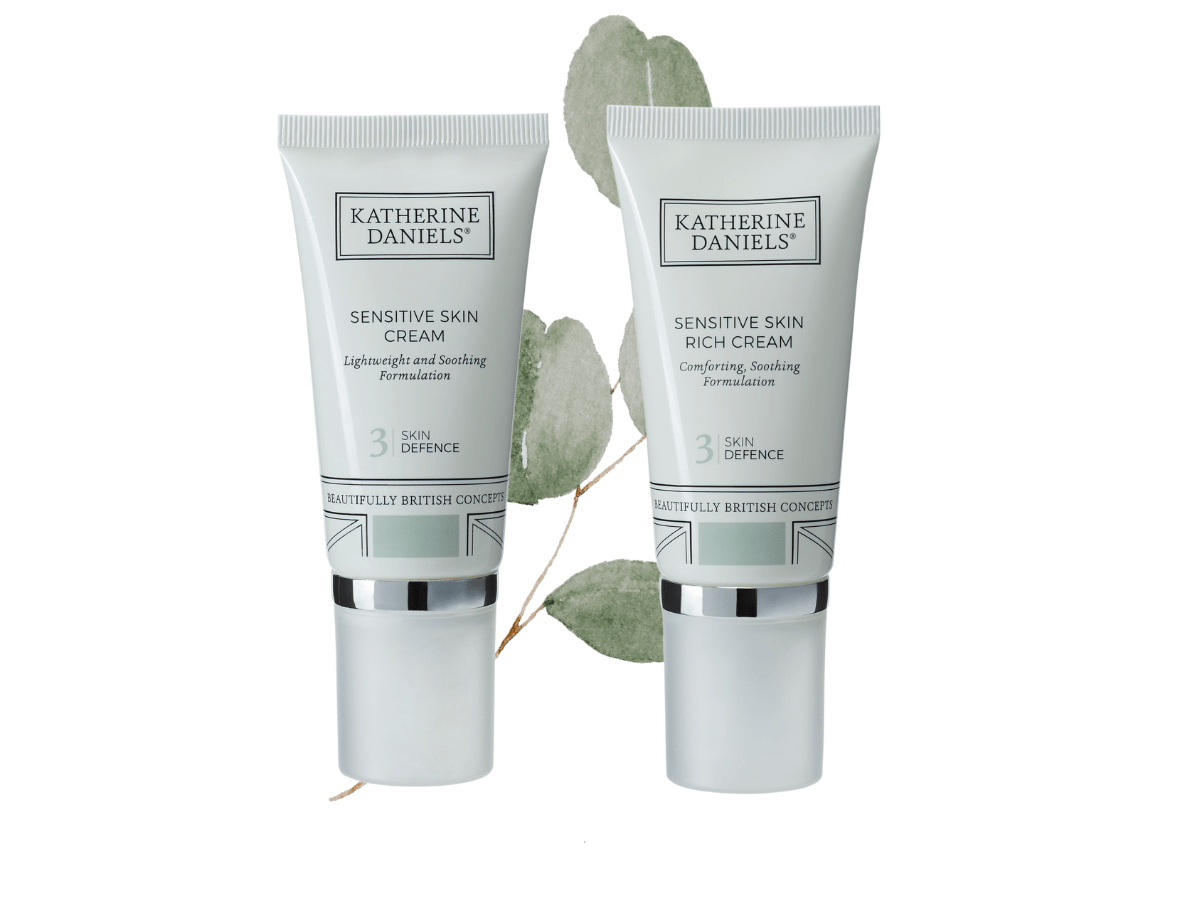
Our 2-part blog covers sensitive skin. Today in Part 1 we discover how skin sensitivity ranges from one extreme to another.
Why is your skin sensitive?
Often because of a weakened skin defence barrier. In other words the protective layer of your skin that keeps the ‘good stuff’ in and the ‘bad stuff’ out.
Skin sensitivity ranges from one extreme to another. In its mild form it can appear as occasional flushing and changes of temperature. In its most severe form it may feel like its burning with stinging sensations, periods of high colour and flushing which lasts longer than normal.
How does skin sensitivity happen?
We’re rarely born with sensitive skin. It happens when your natural skin barrier becomes weak, it responds to external stimulation, touch, heat or products. More severe redness is often seen after the intake of caffeine, alcohol or spicy foods. Hormonal changes often impact a sensitive skin too.
It’s often linked to your skin type?
It often develops from dry skin types. Dry skin lacks its natural lubricant, sebum and dry skin presents as a clear complexion with fine pores, rarely suffering with spots and blackheads. Dry skin in its youth looks ‘porcelain and perfect’. it’s often taken for granted. In other words we adopt the attitude of ‘If it’s not broken why fix it.’ When dry skin isn’t protected it will become sensitive because of the lack of sebum.
The ageing of a sensitive skin
The ageing process starts from your early twenties. Visible signs of ageing appear from your late twenties to early thirties.
Unfortunately, sensitive skin ages more quickly and as it ages it becomes more sensitive.
It’s important to treat the ageing of your skin with the sensitivity issues. This isn’t always possible but something that we are very proud to be able to do for you.
Choose the correct Katherine Daniels products and you can treat the five main experiences associated with sensitive skin:-
• Heat
• Pain
• Redness
• Inflammation
• Ageing
To start the process we strengthen your skin with products that are gentle and effective. When cared for correctly your skin will become soft, supple and strong.
The environment and its effect on your sensitive skin
Both urban and rural environments can be damaging without the right skin protection.
We think of towns and cities as being the pollution culprit but rural environments can be just as damaging. Thanks to fertilisers, pesticides, methane gases and dust. These all contain pollutants which attack your skin if undefended.
City living. In built up areas the air contains as much as 97% heavy metals and gases. These pollutants come from transport fumes, factory emissions and air traffic. They leave your skin vulnerable to sensitivity.
Coastal living. Yes, the sun is good for us. A great source of vitamin D, it helps with muscle and bone strength but it contains UVA (the ageing rays) and UVB (the burning rays) which leaves your skin at risk if unprotected. The wind and brisk sea breezes can cause wind burn which is just as damaging as the sun to your unprotected skin.
Stress and anxiety effect sensitive skin
Skin sensitivity is closely linked to your central nervous system.
When upset, stressed or tired your whole system behaves in a negative way. This makes you more sensitive.
Internally – causing emotional behaviour.
Externally – sensitive, reactive skin.
When you’re stressed neurotransmitters are released by your brain causing a release of aggressive messengers which stimulate the nerve endings in your skin to produce redness, itching, heat, swelling and pain.
These responses to stress have a negative effect on your cells that produce your skins youth proteins (collagen and elastin). This causes premature skin ageing, meaning sensitive skin ages more quickly. And remember it gets more sensitive as it ages. If neglected at this stage the development of rosacea may begin.
Here are our best skincare creams for Sensitive Skin
Sensitive Skin Cream is a lightweight texture, it’s a gel cream. It brings a soothed skin finish without surface oiliness, it will immediately calm the surface of your sensitive skin.
Thanks to the hyper effective comforting and soothing formulation it will help to reduce the signs of skin sensitivity: Pain, swelling, itching, redness and heat. With regular use your skin will be restored, it will be more able to defend itself and more able to act youthfully.
One more thing…
Because of its lightweight formulation we recommend Sensitive Skin Cream if you’re suffering with advanced stages of skin redness. This inflammatory skin condition often appears as a butterfly shape from the middle of your forehead, across your cheeks, nose and chin. You may suffer from persistent redness and visible blood capillaries, your skin will be sensitive and reactive with pimples throughout the redness. In more severe cases you may see a thickening of your skin, especially around your nose, the redness may then get deeper and look purple in colour.
Sensitive Skin Rich Cream is a comforting texture, it cocoons your fragile sensitive skin bringing an immediate calming sensation. It will immediately soothe the surface of your dry sensitive skin.
Thanks to the hyper effective formulation it will help to reduce the signs of skin sensitivity: pain, swelling, itching, redness and heat. With regular use your skin will be restored, it will be more able to defend itself or able to act more youthfully.
What makes our Sensitive Skin and Sensitive Skin Rich Creams so good?…
Our Neuro Soothing Cosmetic investigates the relationship between your nervous system and your skin. Your nervous system signals your skin to respond or react to stimulus. It does this by a skin messaging service, it instructs the release of the aggressive messenger. It’s this that creates your skin reaction. Pain, swelling, itching, redness, heat.
To reduce this aggressive message we must change the signal and the messages to messages that tell your skin to be calm. And act like an anti-inflammatory. By using this ingredient, over time your skin learns to react less and respond differently. It becomes stronger, more resilient to stimulus.

